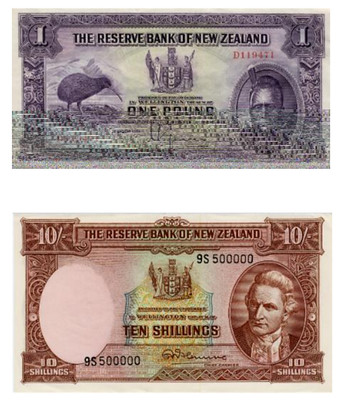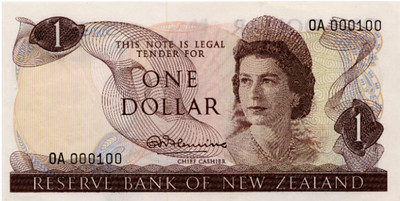
PREV ARTICLE
NEXT ARTICLE
FULL ISSUE
PREV FULL ISSUE
V25 2022 INDEX E-SYLUM ARCHIVE ELIZABETH II ON NEW ZEALAND CURRENCYMartin Purdy writes: "Following up on the item in The E-Sylum on effigies of the Queen on currency around the world, our Reserve Bank here in NZ recently published this to mark the Platinum Jubilee. Both components in the paper were originally more detailed but a bit wound up on the cutting-room floor to make it fit the required format." Nicely done - the complete paper is available online. -Editor
New Zealand was one of the last countries to switch to decimal currency. Dollars and cents replaced pounds, shillings and pence on 10 July 1967. Public interest in the introduction of decimal currency was high, and everyone had an opinion on the designs of the new coins and banknotes. The final note designs were tightly guarded by the Reserve Bank and released in June 1967, only a month before ‘DC Day', short for Decimal Changeover Day. The Reserve Bank was keen to avoid giving any advantage to would-be counterfeiters wanting to con a public unfamiliar with the new genuine banknotes. All six new banknote denominations were of different sizes and colours but had a very similar face design which was dominated by a stately portrait of Queen Elizabeth II, unsmiling but dignified, facing slightly to the viewer's left and wearing a tiara. Maori motifs and geometric patterns were added to enhance the design and supply the necessary security. This portrait of the Queen was one of the more widely-used throughout the British Commonwealth; being selected by five other countries to feature on their banknotes. The engraving was based on a photograph taken by London photographer Anthony Buckley several years earlier (on 19 October 1960) in the Blue Drawing Room of Buckingham Palace when the Queen was 34 years old. Some publications incorrectly state the photograph was taken at the time of the Queen's Coronation in 1953.
To read the complete article, see:
To read the earlier E-Sylum articles, see:
Wayne Homren, Editor The Numismatic Bibliomania Society is a non-profit organization promoting numismatic literature. See our web site at coinbooks.org. To submit items for publication in The E-Sylum, write to the Editor at this address: whomren@gmail.com To subscribe go to: https://my.binhost.com/lists/listinfo/esylum All Rights Reserved. NBS Home Page Contact the NBS webmaster 
|

